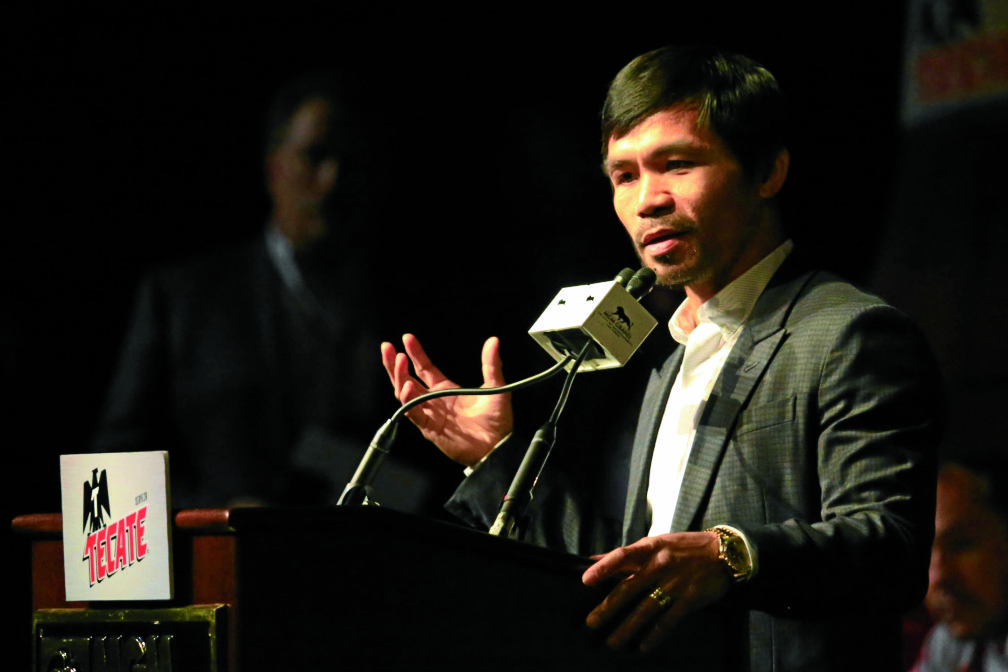From $20 to $20M, Pacquiao’s last payday?

Manny Pacquiao during the final press conference at the David Copperfield Theater inside MGM Hotel in Las Vegas, April 6, 2016. PHOTO BY REM ZAMORA
LAS VEGAS—Twenty-one years after clambering through the ropes for his first professional fight, Manny Pacquiao will make the long walk to the ring for what could well be the final time on Saturday in Las Vegas.
It will complete one of the most vivid rags-to-riches journeys in a sport that is famous for them, an odyssey which has taken him from a $20 purse to a reported $20 million payday for this weekend’s
Article continues after this advertisementfinale against Tim Bradley.
A lot has changed for Pacquiao since Jan. 25, 1995 when, as a skinny 16-year-old, he outpointed Edmund Enting Ignacio in a four-round bout before a few hundred spectators on Mindoro island.
Pacquiao traveled to that fight by ferry, buying his own ticket for the boat ride from Manila for a contest which earned him 1,000 pesos ($21 at today’s rate of exchange).
Article continues after this advertisement“It was very small,” Pacquiao recalled. “But it was my desire to box. I boxed because I wanted to help my mother and my family.”
No money
Boxing provided Pacquiao with an escape from poverty.
“We had no money. I was the breadwinner. I helped send my brother to school, I worked at boxing,” he said. “I loved doing it because I was helping my family. When you have nothing, you don’t care how hard the work is.”
Since that first purse, Pacquiao’s fights have generated an estimated $500 million, swollen by his cut from last year’s money-spinning “Fight of the Century” against Floyd Mayweather Jr., which ended in defeat.
Pacquiao will bank another bumper paycheck this weekend.
Even allowing that Saturday’s bout has struggled to generate the crackle of anticipation that surrounded his iconic battles with Mayweather, Oscar de la Hoya and Ricky Hatton, Pacquiao remains big box office.
Promoter Bob Arum pinpoints Pacquiao’s narrative arc as the source of his enduring appeal.
“He’s just a great story,” Arum said. “A rags-to-riches story. A kid from the streets of the Philippines, lived in a cardboard shack. Worked his way up, comes to the United States … becomes one of the biggest fighters of our time.
“I was in boxing for a long time … I remember all the Filipinos. Some of them were good. Some were OK. None of them were great. Manny is great.”
A stained legacy?
Yet the final phase of Pacquiao’s career has been overshadowed by a controversy the devoutly religious fighter ignited in February when he said that homosexuals were “worse than animals.”
Those comments, after same-sex marriage was legalized in the United States, triggered a wave of revulsion and threatened to leave a stain on Pacquiao’s legacy.
Sponsors led by Nike swiftly cut their ties, and he was verbally abused by a man outside a Los Angeles restaurant.
Even Arum could not hide his dismay.
“There are people who hold sincere religious beliefs against same-sex marriage and homosexuality,” Arum said.
“The problem is Manny didn’t leave it there. He made analogies to justify his position and those analogies got him in trouble because they’re very hurtful. And wrong.”
Retirement doubted
Pacquiao insists the controversy has not distracted him from his fight with Bradley.
Pacquiao’s determination to help the poor has been a theme of his pursuit of public office. Elected to Congress in 2010, he is running for the Senate next month.
“I’m taking this fight and going back to the Philippines to focus on politics, to help the poor,” Pacquiao said.
Arum and trainer Freddie Roach have expressed skepticism that the fighter will stay retired.
“I still think he has a lot left in him,” Roach said.
“If he wins this fight well, he’s going to find a way to continue,” Arum said. “If you’ve been doing something well since you were seven or eight years old, it’s a tough thing to give up.” AFP